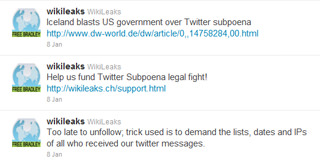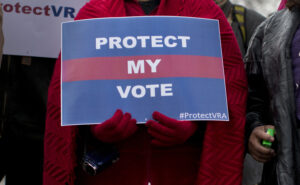Twitter Fights the Man
When the Justice Department hit Twitter with a court order demanding the private data of certain users associated with WikiLeaks, the G-men might have expected that the social networking site would wilt like the half-dozen easily bullied companies that have cut off the whistle-blower, but Twitter, in the words of Wired's Ryan Singel, "beta-tested a spine." (more)
When the Justice Department hit Twitter with a court order demanding the private data of certain users associated with WikiLeaks, the G-men might have expected that the social networking site would wilt like the half-dozen easily bullied companies that have cut off the whistle-blower, but Twitter, in the words of Wired’s Ryan Singel, “beta-tested a spine.”
Not only did the government want this data, but it wanted Twitter to keep quiet about handing it over. To that end, Justice secured a gag order. Twitter fought the gag order in order to inform those users under investigation and give them a chance to organize a defense.
Twitter has been integral to WikiLeaks’ attempts to stay afloat in the face of relentless attacks on its servers, finances and personnel. It is also a private company, and those tend to react rather cowardly to government pressure. Behold Amazon, PayPal, Facebook, Mastercard, Visa and Bank of America.
Surely the United States government would claim vital interests in its pursuit of Twitter data, but so too would the government of Iran. Let us not forget how Twitter enabled protesters in that country to resist their government.
For the most part private corporations own the means of communication, and the only avenues for resistance and free expression. It is nice to see one consider the interests of its users for a change. — PZS
Your support matters…Wired:
To Twitter’s credit, the company didn’t just open up its database, find the information the feds were seeking (such as the IP and e-mail addresses used by the targets) and quietly continue on with building new features. Instead the company successfully challenged the gag order in court, and then told the targets their data was being requested, giving them time to try and quash the order themselves.
Twitter and other companies, notably Google, have a policy of notifying a user before responding to a subpoena, or a similar request for records. That gives the user a fair chance to go to court and try and quash the subpoena. That’s a great policy. But it has one fatal flaw. If the records request comes with a gag order, the company can’t notify anyone. And it’s quite routine for law enforcement to staple a gag order to a records request.
That’s what makes Twitter’s move so important. It briefly carried the torch for its users during that crucial period when, because of the gag order, its users couldn’t carry it themselves. The company’s action in asking for the gag order to be overturned sets a new precedent that we can only hope that other companies begin to follow.
Independent journalism is under threat and overshadowed by heavily funded mainstream media.
You can help level the playing field. Become a member.
Your tax-deductible contribution keeps us digging beneath the headlines to give you thought-provoking, investigative reporting and analysis that unearths what's really happening- without compromise.
Give today to support our courageous, independent journalists.






You need to be a supporter to comment.
There are currently no responses to this article.
Be the first to respond.